2005 in Review: Bulgarian Construction and Restructuring
Sofia Echo Com, Lucy Cooper, 09.01.2006
THE past year was an eventful one for the sphere of tourism in Bulgaria, with 2005 seeing major structural changes in the governance of tourism, as well as structural challenges in the physical sense concerning construction at Bulgaria’s coastal and mountain resorts; there was also debate over “foreigner prices”, the entrance of budget airlines onto the Bulgarian market, as well as an assortment of initiatives, ranging from the traditional to the more unorthodox, to attract tourists to Bulgaria. Tourism began the year under the hat of the Economy Ministry, as part of the portfolio of deputy economy minister Dimitar Hadjinikolov. Cabinet reshuffles in February found it a new home in the newly-formed Ministry of Culture and Tourism, under Nina Chilova, but when the new ministry dropped Tourism from its title, to become the Ministry of Culture, Minister of Culture Stefan Danailov sacked Bisser Yalumov as head of the Executive Agency on Tourism, saying it was time the agency became an independent structure. The move came amid parliamentary committee discussions on amendments to the Act on Tourism. These were finally approved in November, creating a new government-run State Agency on Tourism. As 2005 drew to a close, it looked as though the agency was to see out the year amid struggles within the ruling coalition of the Bulgarian Socialist Party, the National Movement Simeon II and the Movement for Rights and Freedoms over the appointment of an agency head. The person appointed would have considerable authority; being responsible for co-ordinating quality control of tourist products, registering tour operators’ and tour agents’ activities and categorising tourist facilities; taking on the tourism industry-related duties previously under the auspice of the Ministry of Culture and Tourism, giving the importance of the appointment substantial political weight. The Tourism Act amendments approved in November had other significant results, such as finally making illegal Bulgaria’s “double pricing” system, under which foreigners paid higher prices than Bulgarians at hotels, in restaurants and at resorts. The abolishing of “foreigner prices”, required for Bulgaria to join the EU, attracted its fair share of critics, not least ultra-nationalist group Ataka. They protested that uniform prices for foreigners and Bulgarians would result in a general increase in prices, meaning that the prices Bulgarians were required to pay would rise. The new law requires that the same prices for foreigners and Bulgarians apply to accommodation sold at hotel reception desks, as well as on the internet, through promotional and commercial brochures and publications, and radio and television programmes. Aside from the structural changes in government, tourism faced more concrete structural problems with the issue of construction, especially at Bulgaria’s Black Sea Coast resorts, resounding throughout the year. Early in the year, concerns over the volume of construction taking place at Black Sea resorts lead to warnings of a decrease in German tourists - a group that had traditionally numbered the highest in foreign visitors to Bulgaria. In April, the consequences of intense construction works were felt, with reports of an oversupply of beds and withdrawal of tourists and tour agencies. Local authorities and hoteliers clashed over bans imposed at the beginning of May on construction work, with hotels eager to finish construction in order to be able to accommodate guests who had paid for beds that did not yet exist. Local authorities in some areas set up checkpoints to prevent heavy vehicles involved in construction work from entering resorts. The summer months bore out the prediction of a drop in German tourists, but they still represented the largest number of foreign visitors in the early summer months. In July, a car bomb at the coastal resort of Obzor, which killed the wife and child of beach concessionaire Ralo Penkov, the suspected target of the attack, and injured two German children, drew negative attention to Bulgaria in the foreign media and for some put a question mark over the safety of the country as a tourist destination. Despite this, the number of visitors to Bulgaria in the first half of 2005, was up more than five per cent on the same period of 2004, with the number of tourists from new EU member states doubling. At the close of the summer season, positive trends had been seen in the numbers of tourists visiting Bulgaria, however, the issues over widespread construction, adequate infrastructure and poor levels of service remained on the agenda to be dealt with before the next season. Measures taken in respect to these issues include proposed bans on construction between May 1 and October 15 2006, with fines of 5000 to 10 000 leva to be enforced, the removal of illegal structures, the issuing of permits based on the pre-existence of adequate infrastructure, and a number of staff training progammes, such as that launched by the Radisson Hotel earlier in the year, to improve the quality and quantity of qualified staff in the hospitality industry. Plans for the creation of a unified tourism register were also underway, to bring together data on tourist facilities and to improve standards. Construction was also on the agenda at Bulgaria’s ski resorts, with bans imposed between December 15 and March 15, but also in the context of the approval in May of plans for The Super Borovets project . The project, to take place in three stages over the next 10 years, envisages the expansion of Borovets’ accommodation capacity, the widening and renovation of ski runs, and a general upgrade of facilities, including the construction of new ski lifts. The project comes in conjunction with Bulgaria’s hopes to host the Winter Olympics 2014. Vitsoha, Borovets and Bansko will be put forward as venues to host the games. Bulgaria’s other ski resorts have also enjoyed a spruce-up this year, with Bansko seeing the opening of a new five-star Kempinki Hotel in October, at which President Georgi Purvanov performed the ceremonial cutting of the ribbon. Other hotel chains, such as the Holiday Inn, which started construction of its first hotel in Bulgaria in March, also staked their confidence in the Bulgarian tourist market, as did budget airline companies, such as Wizz Air and SkyEurope. Wizz Air entered the market in September 2005, when it launched its first low cost flights between Sofia and Budapest, meaning that Bulgaria was no longer the only country in the region not served by a low cost airline. A number of new international flight routes from Bulgarian airports were also opened. Because of the increased flow of air traffic, Sofia Airport plans to open a new terminal next year. Discussions were also underway on concessions for Varna and Bourgas airports, which would include the expansion and upgrading of their facilities. Negotiations over the privatisation strategy of Bulgaria’s national flag carrier, Bulgaria Air, also continued. Finally, 2005 saw the Bulgarian tourist industry trying out a whole host of initiatives to attract tourists to the country. The year began with the Bulgarian Association for Business and Travel’s Ancient and Contemporary Bulgaria CDs, advertising “industrial tourism”, with the proposed renovation of socialist-era factories into museums. Then, in one of the more bizarre bids to attract the “adventure tourist” market, the government passed a Bill on Caves. This pertained to the protection, use and management of caves and in effect created a new sector in Bulgaria’s ever-increasing real estate market: rent-a-cave. The bill provided for caves to be used for scientific research, speleological expeditions, tourism, health, sports and cultural activities. In a more traditional vein, projects focusing on conservation of cultural and historical sites, including the restoration of monasteries and churches, were plentiful in 2005. Then-prime minister Simeon Saxe-Coburg performed a ground-breaking ceremony in March for a project near Kazalnuk in central Bulgaria for the preservation of the Thracian “Valley of the Kings”. In May, the tourist agency and border police joined forces in an initiative to distribute free tourist maps at Varna and Sofia airports and border crossings. At the same time, in an appeal to the health conscious visitor, a smoking ban was imposed on the seafront and beaches at the Black Sea town of Bourgas. The British Red Cross toured bars, offering to exchange smokers’ packs of cigarettes for a sticker explaining the dangers of smoking. In July, a large tourist company and a hotel in Sofia became the first two Bulgarian businesses to be advertised abroad on free post cards, a practice costing more than magazine, TV or billboard advertising. October saw talks over plans for investment in hunting tourism with a UK delegation, the promotion of spa tourism at exhibitions in Moscow and Plovdiv, and Bulgaria’s representation at the World Expo in Japan with its stall: Nature’s Wisdom and Gifts of Nature - Essential for Human Health, Lifestyle and Tolerant Coexistence, promoting the balance of nature and man in Bulgaria. Whatever the relative merits of these various initiatives, the figures continued to rise in 2005. The number of foreigners visiting Bulgaria for a holiday stood at 3 733 614 for the January-October 2005 period, an increase of 3.56 per cent compared to the same period of 2004. Germany retained top position with 570 242 tourists in the first 10 months, followed by Greece with 545 899 tourists, Macedonia with 492 036 tourists and Serbia-Montenegro with 452 650 tourists. The number of UK tourists stood at 356 421, up 36.10 per cent year-on-year, while the number of Turkish holidaymakers increased by 39.10 per cent to 225 830. Russian tourists also increased by 17.60 per cent to 167 643. According to official Agency on Tourism statistics, foreign tourists spent 1.661 billion euro in Bulgaria between January and September 2005, increasing revenues by almost 10 per cent compared to the same period of 2004. see source
 Member of:
Member of:
















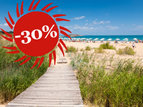

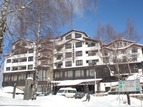


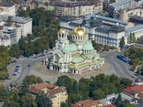
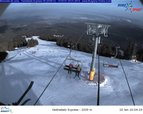

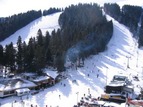


 Touroperator
Touroperator
